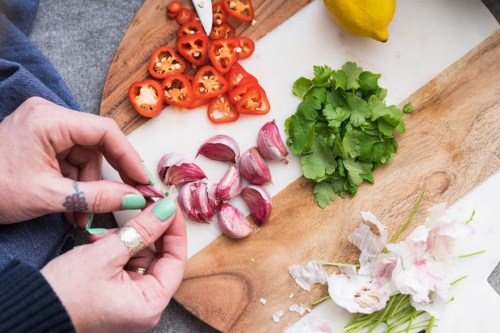These are the best veggies to eat raw (and the ones you should cook)
Two dieticians weigh in on what raw vegetables are most nutritious in their OG form, and which should definitely be cooked.

Living your life according to the “eat the rainbow” motto requires getting a little creative in the kitchen. Sure, spiralizing, roasting, and Instant-potting are all delish options, but according to dietitians how you cook (or don’t cook) your veggies alters their nutrient profile—for better or for worse.
“Heat can alter the nutrient composition in vegetables. For some, that’s a good thing, and for others, it may mean you’re losing precious nutrients,” explains Nora Minno, RDN, a registered dietitian and personal trainer in New York City. Below, Minno and Sonya Angelone, RDN, break down exactly which produce should be cooked to vitamin-packed perfection, and which are better adornments for a crudité platter.
Veggies to eat raw
“Some vegetables can loose their nutrients when cooked, especially those containing the water-soluble B-group vitamins and vitamin C,” Minno says. “For example, studies have shown that the majority of Vitamin C found in fresh spinach can be lost when cooked at high temperatures.”
In case you’re wondering why these vitamins matter anyhow, here’s the gist: B-group vitamins (include B6, folate, B12, and more) help with critical processes like converting nutrients into energy, aiding neurological function, and assisting with DNA repair. And vitamin C has been found to protect aging memory and boost immunity.
With that in mind, here are the veggies to enjoy au naturel• Broccoli• Onions• Jicama• Leafy greens like lettuce, arugula, kale, and spinach• Red Bell Pepper
Veggies to cook (and how to cook them)
On the opposite end of the vegetable spectrum, Minno says that some produce actually gets a nutrient upgrade when it’s cooked. “This is because heat can change some nutrients into a more active form or even break down cell walls, releasing certain nutrients,” she tells me. “For example, when tomatoes are cooked, their thick cell walls are broken, releasing more nutrients and making lycopene [a powerful antioxidant] more readily available.”
Here are some vegetables best served hot• Carrots• Potatoes• Sweet Potatoes• Asparagus• Tomatoes
When you go to whip these up into glorious side dishes or the main event, Angelone recommends skipping a basic boil technique since “minerals leach into the water, which is typically thrown away along with the nutrients.” Instead, roast, steam, or microwave them for optimal good-for-you-ness.
Of course, both experts note that consuming produce in any form is a win for your bod. So if the thought of eating your broc raw makes you want to gag, go ahead and roast it in a zesty spice blend to mask the flavor. “At the end of the day, the most important thing is that you are eating a variety of fruits, vegetables, and legumes. Period,” Minno emphasizes. “You’ll still be getting lots of important nutrients and at the end of the day, eating a carrot dipped in hummus will provide more nutritional value than a cracker or a chip dipped in hummus.”
Instant Pot-ready French girl squash? Yes, please. And yes, it’s totally safe to eat the skin.
Sign Up for Our Daily Newsletter
Get all the latest in wellness, trends, food, fitness, beauty, and more delivered right to your inbox.
Got it, you've been added to our email list.










